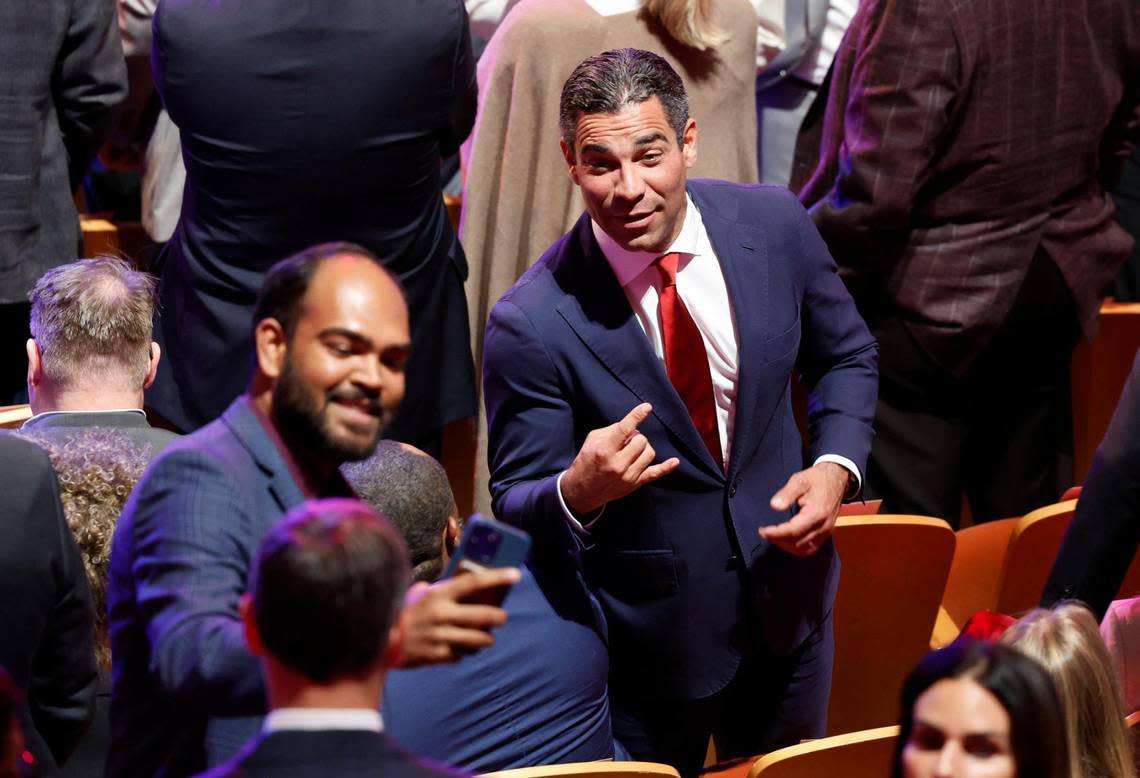Miami Dysfunction: City code lets mayor have a dozen side gigs. But is that good for us? | Opinion

- Oops!Something went wrong.Please try again later.
Francis Suarez has reinvented the office of Miami mayor — and Suarez benefits the most.
The 46-year-old lawyer had a negative net worth when he was first elected commissioner in 2014. His personal wealth soared while in office, especially once he was elected mayor in 2017, reaching $3.4 million by the end of 2022, the second year in a row in which Suarez more than doubled his net worth, the Herald reported. In the past 20 months, he’s had more than a dozen lucrative side gigs not disclosed until he had to under federal rules during his short-lived presidential bid.
There are serious questions about whether Suarez used his high-profile position to connect to powerful people and businesses that have given him employment arrangements.
Most recently, the Herald reported on his six-figure advising arrangement for two financial firms run by close associates of a Russian oligarch. Other sources of income include a cryptocurrency mining company whose branded shirt he wore while he promoted Miami as a crypto capital, and a developer whose company sought help from the mayor’s office to overcome a regulatory hurdle. The latter is under federal investigation, the Herald reported. Suarez denies wrongdoing.
Accountability shouldn’t stop with law enforcement investigations.
Already, the Florida Legislature this year tightened personal finance disclosure requirements for local officials, requiring an itemized breakdown of all sources of income above $1,000. That’s an important step because previous loose requirements allowed Suarez to fly under the radar.
Even if Suarez hasn’t broken any laws, the city of Miami should look into how its mayor can receive a $130,000 annual compensation package from taxpayers while holding multiple side gigs that bring into question his commitment to public service.
It’s time to revisit Miami’s unusual mayoral system, which gives him a bright spotlight, but little authority.
As a part-time mayor, Suarez is entitled to hold outside employment, even though former mayors who spoke to the Herald Editorial Board said that’s more of a full-time occupation. Suarez’s controversies look like a symptom of a larger issue that has prompted the Herald Editorial Board to examine the city’s government in a series called Miami Dysfunction.
There is no foolproof way to build a city government immune from people who are seeking personal gain. We acknowledged that when we proposed a larger City Commission and moving city elections to boost citizen involvement. Yet it’s clear the status quo isn’t working, as seen with Suarez, the recent arrest of now-suspended Commissioner Alex Diaz de la Portilla and a $63.5 million federal jury verdict against Commissioner Joe Carollo.
While in previous editorials we proffered specific reforms, when it comes to the mayor’s job we hope to spur a discussion among residents. We understand there are different ideas after talking to about half dozen people with deep knowledge about the city.
Carollo, who’s appealing that federal verdict, has proposed making the mayoral position full time. Former Mayor Tomas Regalado said the only measure that will restore voters’ faith in City Hall is a city charter amendment that prohibits the mayor from holding outside employment. Former Commissioner Ken Russell said a “strong mayor” system that allows that person to run the city would make them more accountable to voters.
“In my view, [Suarez] decided to vacate his position as head of the government,” Regalado, who’s considering running again after Suarez leaves office in 2025, told the Board.
To us, Miami’s government — from its small five-member commission to embarrassingly low voter turnout — seems outdated for a city whose boom in recent years has attracted some of the richest and most powerful people in the country, along with economic interests looking to buy influence at City Hall.
Florida mayors
Florida municipalities generally have two types of figure heads. A “weak mayor,” which is the case in Miami Beach, is a member of the commission or council and doesn’t have more power than other commissioners. A “strong mayor” — like the mayor of Miami-Dade County or Hialeah — runs the government like an executive.
“Each of these two would work better than what we have [in Miami],” former state representative and elections lawyer J.C. Planas told the Editorial Board.
Miami’s system falls somewhere in between. The mayor isn’t part of the commission, but his powers are limited to vetoing legislation, proposing a budget, declaring emergencies and hiring and firing the city manager who runs city government, though commissioners can overrule that decision.
In other words, the Miami mayor title carries lots of buzz but relatively little power.
A skilled politician could use that high-profile position to push for their priorities. Suarez did that when he whipped up commission votes that approved a controversial deal to allow Inter Miami to build a soccer stadium and commercial complex on public land.. But that person can also use the status of Magic City mayor for influence peddling and personal gain.
In 2018, Suarez tried to pass a strong-mayor referendum that would give him, among other responsibilities, power over a 4,000-person municipal workforce. Suarez had just been elected mayor and his proposal irritated powerful politicians who fought the measure — which the Herald Editorial Board also opposed — and eventually helped defeat it with voters.
Could a successful referendum have prevented Suarez from taking so many outside gigs? Like every other alternative, a strong mayor would have benefits by giving that person authority to execute policies, as well as pitfalls — the possibility of too much political interference in the city’s administration.
If there’s a way to improve Miami, it won’t be easy. Democracy is messy, but it is worth preserving in the Magic City.
Click here to send the letter.

